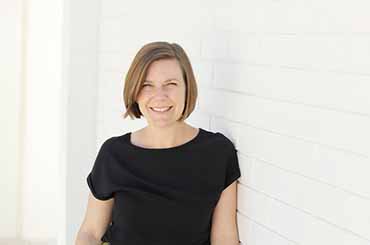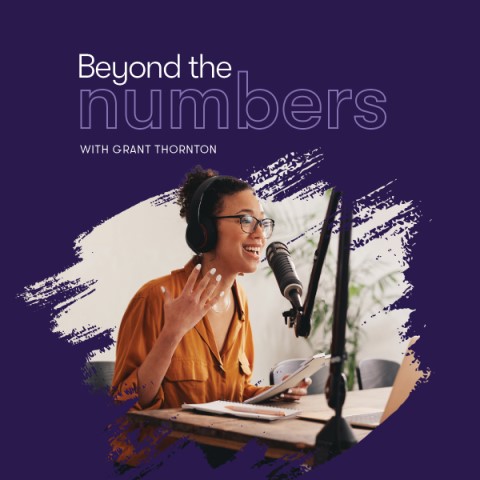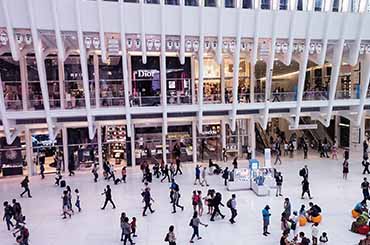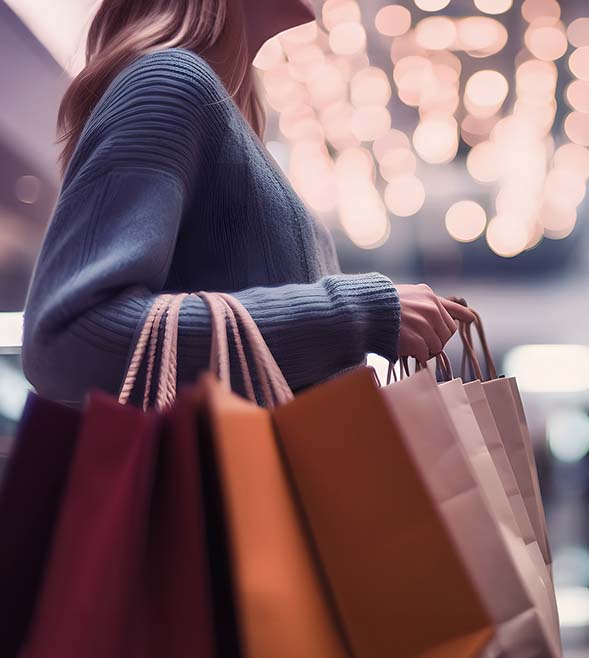- Market services
- Indigenous advisory
-
Compliance audits & reviews
Our audit team undertakes the complete range of audits required of Australian accounting laws to help you to help you meet obligations or fulfil best practice procedures.
-
Audit quality
We are fiercely dedicated to quality, use proven and globally tested audit methodologies, and invest in technology and innovation.
-
Financial reporting advisory
Our financial reporting advisory team helps you understand changes in accounting standards, develop strategies and communicate with your stakeholders.
-
Audit advisory
Grant Thornton’s audit advisory team works alongside our clients, providing a full range of reviews and audits required of your business.

-
Corporate tax & advisory
We provide comprehensive corporate tax and advisory service across the full spectrum of the corporate tax process.
-
Private business tax & advisory
We work with private businesses and their leaders on all their business tax and advisory needs.
-
Tax compliance
We work alongside clients to manage all tax compliance needs and identify potential compliance or tax risk issues.
-
Employment tax
We help clients understand and address their employment tax obligations to ensure compliance and optimal tax positioning for their business and employees.
-
International tax
We understand what it means to manage tax issues across multiple jurisdictions, and create effective strategies to address complex challenges.
-
GST, stamp duty & indirect tax
Our deep technical knowledge and practical experience means we can help you manage and minimise the impact of GST and indirect tax, like stamp duty.
-
Tax law
Our team – which includes tax lawyers – helps you understand and implement regulatory requirements for your business.
-
Innovation Incentives
Our national team has extensive experience navigating all aspects of the government grants and research and development tax incentives.
-
Transfer pricing
Transfer pricing is one of the most challenging tax issues. We help clients with all their transfer pricing requirements.
-
Tax digital consulting
We analyse high-volume and unstructured data from multiple sources from our clients to give them actionable insights for complex business problems.
-
Corporate simplification
We provide corporate simplification and managed wind-down advice to help streamline and further improve your business.
-
Superannuation and SMSF
Increasingly, Australians are seeing the benefits, advantages and flexibility of taking control of their own superannuation and retirement planning.

-
Payroll consulting & Award compliance
Many organisations are grappling with a myriad of employee agreements and obligations, resulting in a wide variety of payments to their people.
-
Cyber resilience
The spectrum of cyber risks and threats is now so significant that simply addressing cybersecurity on its own isn’t enough.
-
Internal audit
We provide independent oversight and review of your organisation's control environments to manage key risks, inform good decision-making and improve performance.
-
Financial crime
Our team helps clients navigate and meet their obligations to mitigate crime as well as develop and implement their risk management strategies.
-
Consumer Data Right
Consumer Data Right (CDR) aims to provide Australians with more control over how their data is used and disclosed.
-
Risk management
We enable our clients to achieve their strategic objectives, fulfil their purpose and live their values supported by effective and appropriate risk management.
-
Controls assurance
In Australia, as with other developed economies, regulatory and market expectations regarding corporate transparency continue to increase.
-
Governance
Through fit for purpose governance we enable our clients to make the appropriate decisions on a timely basis.
-
Regulatory compliance
We enable our clients to navigate and meet their regulatory and compliance obligations.

-
Forensic accounting and dispute advisory
Our team advises at all stages of a litigation dispute, taking an independent view while gathering and reviewing evidence and contributing to expert reports.
-
Investigations
Our licensed forensic investigators with domestic and international experience deliver high quality results in the jurisdictions in which you operate.
-
Asset tracing investigations
Our team of specialist forensic accountants and investigators have extensive experience in tracing assets and the flow of funds.

-
Mergers and acquisitions
Our mergers and acquisitions specialists guide you through the whole process to get the deal done and lay the groundwork for long-term success.
-
Acquisition search & strategy
We help clients identify, finance, perform due diligence and execute acquisitions to maximise the growth opportunities of your business.
-
Selling a business
Our M&A team works with clients to achieve a full or partial sale of their business, to ensure achievement of strategic ambitions and optimal outcomes for stakeholders.
-
Operational deal services
Our operational deal services team helps to ensure the greatest possible outcome and value is gained through post merger integration or post acquisition integration.
-
Transaction advisory
Our transaction advisory services support our clients to make informed investment decisions through robust financial due diligence.
-
Business valuations
We use our expertise and unique and in-depth methodology to undertake business valuations to help clients meet strategic goals.
-
Tax in mergers & acquisition
We provide expert advice for all M&A taxation aspects to ensure you meet all obligations and are optimally positioned.

-
Corporate finance
We provide effective and strategic corporate finance services across all stages of investments and transactions so clients can better manage costs and maximise returns.
-
Debt advisory
We work closely with clients and lenders to provide holistic debt advisory services so you can raise or manage existing debt to meet your strategic goals.
-
Working capital optimisation
Our proven methodology identifies opportunities to improve your processes and optimise working capital, and we work with to implement changes and monitor their effectiveness.
-
Capital markets
Our team has significant experience in capital markets and helps across every phase of the IPO process.
-
Debt and project finance raising
Backed by our experience accessing full range of available funding types, we work with clients to develop and implement capital raising strategies.
-
Private equity
We provide advice in accessing private equity capital.
-
Financial modelling
Our financial modelling advisory team provides strategic, economic, financial and valuation advice for project types and sizes.
-
Payments advisory
We provide merchants-focused payments advice on all aspects of payment processes and technologies.

-
Voluntary administration & DOCA
We help businesses considering or in voluntary administration to achieve best possible outcomes.
-
Corporate insolvency & liquidation
We help clients facing corporate insolvency to undertake the liquidation process to achieve a fair and orderly company wind up.
-
Complex and international insolvency
As corporate finance specialists, Grant Thornton can help you with raising equity, listings, corporate structuring and compliance.
-
Safe Harbour advisory
Our Safe Harbour Advisory helps directors address requirements for Safe Harbour protection and business turnaround.
-
Bankruptcy and personal insolvency
We help clients make informed choices around bankruptcy and personal insolvency to ensure the best personal and stakeholder outcome.
-
Creditor advisory services
Our credit advisory services team works provides clients with credit management assistance and credit advice to recapture otherwise lost value.
-
Small business restructuring process
We provide expert advice and guidance for businesses that may need to enter or are currently in small business restructuring process.
-
Asset tracing investigations
Our team of specialist forensic accountants and investigators have extensive experience in tracing assets and the flow of funds.

-
Independent business reviews
Does your company need a health check? Grant Thornton’s expert team can help you get to the heart of your issues to drive sustainable growth.
-
Commercial performance
We help clients improve commercial performance, profitability and address challenges after internal or external triggers require a major business model shift.
-
Safe Harbour advisory
Our Safe Harbour advisory helps directors address requirements for Safe Harbour protection and business turnaround.
-
Corporate simplification
We provide corporate simplification and managed wind-down advice to help streamline and further improve your business.
-
Director advisory services
We provide strategic director advisory services in times of business distress to help directors navigate issues and protect their company and themselves from liability.
-
Debt advisory
We work closely with clients and lenders to provide holistic debt advisory services so you can raise or manage existing debt to meet your strategic goals.

-
Business planning & strategy
Our clients can access business planning and strategy advice through our value add business strategy sessions.
-
Private business company secretarial services
We provide company secretarial services and expert advice for private businesses on all company secretarial matters.
-
Outsourced accounting services
We act as a third-party partner to international businesses looking to invest in Australia on your day-to-day finance and accounting needs.
-
Superannuation and SMSF
We provide SMSF advisory services across all aspects of superannuation and associated tax laws to help you protect and grow your wealth.
-
Management reporting
We help you build comprehensive management reporting so that you have key insights as your business grows and changes.
-
Financial reporting
We help with all financial reporting needs, including set up, scaling up, spotting issues and improving efficiency.
-
Forecasting & budgeting
We help you build and maintain a business forecasting and budgeting model for ongoing insights about your business.
-
ATO audit support
Our team of experts provide ATO audit support across the whole process to ensure ATO requirements are met.
-
Family business consulting
Our family business consulting team works with family businesses on running their businesses for continued future success.
-
Private business taxation and structuring
We help private business leaders efficiently structure their organisation for optimal operation and tax compliance.
-
Outsourced CFO services
Our outsourced CFO services provide a full suite of CFO, tax and finance services and advice to help clients manage risk, optimise operations and grow.
-
ESG & sustainability reporting
There is a growing demand for organisations to provide transparency on their commitment to sustainability and disclosure of the nonfinancial impacts of their business activities. Commonly, the responsibility for sustainability and ESG reporting is landing with CFOs and finance teams, requiring a reassessment of a range of reporting processes and controls.
-
ESG & sustainability advisory
With the ESG and sustainability landscape continuing to evolve, we are focussed on helping your business to understand what ESG and sustainability represents and the opportunities and challenges it can provide.
-
ESG, sustainability and climate reporting assurance
As the demand for organisations to prepare information in relation to ESG & sustainability continues to increase, through changes in regulatory requirements or stakeholder expectations, there is a growing need for assurance over the information prepared.

-
Management consulting
Our management consulting services team helps you to plan and implement the right strategy to deliver sustainable growth.
-
Financial consulting
We provide financial consulting services to keep your business running so you focus on your clients and reaching strategic goals.

-
China practice
The investment opportunities between Australia and China are well established yet, in recent years, have also diversified.
-
Japan practice
The trading partnership between Japan and Australia is long-standing and increasingly important to both countries’ economies.
-
India practice
It’s an exciting time for Indian and Australian businesses looking to each jurisdiction as part of their growth ambitions.
-
Singapore practice
Our Singapore Practice works alongside Singaporean companies to achieve growth through investment and market expansion into Australia.

-
 Insight Australian wine export strategies post-China tariff removalFollowing the recent removal of tariffs on Australian wine by China, the industry is keen to rebuild relations and explore the right export markets. This presents Australian wine producers with a chance to reassess their position in the global market.
Insight Australian wine export strategies post-China tariff removalFollowing the recent removal of tariffs on Australian wine by China, the industry is keen to rebuild relations and explore the right export markets. This presents Australian wine producers with a chance to reassess their position in the global market. -
 Insight Identify your opportunities in the complex landscape of fuel tax creditsThe landscape of fuel tax credits (FTC) is constantly evolving due to ongoing economic and technological developments. This dynamic environment presents both challenges and opportunities for businesses with significant fuel consumption.
Insight Identify your opportunities in the complex landscape of fuel tax creditsThe landscape of fuel tax credits (FTC) is constantly evolving due to ongoing economic and technological developments. This dynamic environment presents both challenges and opportunities for businesses with significant fuel consumption. -
 Client Alert March 2024 Update: NSW Grants for Net Zero Manufacturing and Physical SciencesSome major NSW grant programs have been announced, supporting projects in clean technology innovation, low carbon product manufacturing, renewable manufacturing and physical sciences.
Client Alert March 2024 Update: NSW Grants for Net Zero Manufacturing and Physical SciencesSome major NSW grant programs have been announced, supporting projects in clean technology innovation, low carbon product manufacturing, renewable manufacturing and physical sciences. -
 Insight Navigating a complex Agribusiness, Food and Beverage deals landscape in 2024Despite a 14% global decline in Agribusiness, Food, and Beverage M&A deals, 2024 shows promise with expected global interest rate stabilisation. Given the sector's role in global sustainability, businesses can tap into opportunities in food manufacturing and waste minimisation.
Insight Navigating a complex Agribusiness, Food and Beverage deals landscape in 2024Despite a 14% global decline in Agribusiness, Food, and Beverage M&A deals, 2024 shows promise with expected global interest rate stabilisation. Given the sector's role in global sustainability, businesses can tap into opportunities in food manufacturing and waste minimisation.
-
Renewable Energy
Transformation through energy transition

-
Business Planning and Strategy
Having an honest, broad-reaching and thought-provoking discussion with a skilled, independent advisor can be the catalyst for clarity – a direction to take your business forward and an understanding of what is key to success.

-
Flexibility & benefits
The compelling client experience we’re passionate about creating at Grant Thornton can only be achieved through our people. We’ll encourage you to influence how, when and where you work, and take control of your time.
-
Your career development
At Grant Thornton, we strive to create a culture of continuous learning and growth. Throughout every stage of your career, you’ll to be encouraged and supported to seize opportunities and reach your full potential.
-
Diversity & inclusion
To be able to reach your remarkable, we understand that you need to feel connected and respected as your authentic self – so we listen and strive for deeper understanding of what belonging means.
-
In the community
We’re passionate about making a difference in our communities. Through our sustainability and community engagement initiatives, we aim to contribute to society by creating lasting benefits that empower others to thrive.
-
Graduate opportunities
As a new graduate, we aim to provide you more than just your ‘traditional’ graduate program; instead we kick start your career as an Associate and support you to turn theory into practice.
-
Vacation program
Our vacation experience program will give you the opportunity to begin your career well before you finish your degree.
-
The application process
Applying is simple! Find out more about each stage of the recruitment process here.
-
FAQs
Got questions about applying? Explore frequently asked questions about our early careers programs.
-
Our services lines
Learn about our services at Grant Thornton
-
Current opportunities
Current opportunities
-
Remarkable people
Our team members share their remarkable career journeys and experiences of working at Grant Thornton.
-
Working at Grant Thornton
Explore our culture, benefits and ways we support you in your career.
-
Current opportunities
Positions available.
-
Contact us
Get in touch

What does the future of retail look like in a post-pandemic world? What’s changed? And how are some of Australia’s biggest brands adapting?
In this podcast, Management Partner Liz Webster speaks with Bridget Veals, General Manager for Womenswear and Accessories at David Jones about the latest trends and the current state of the retail industry in Australia.
Throughout Bridget’s career, she has witnessed first-hand significant change within the industry and in her current role, it’s her job to ensure David Jones stays ahead of the curve, ensuring that it continues to be a leader in Australian women’s fashion.
LIZ WEBSTER:
Hi, I’m Liz Webster. I’m a partner in the management consultant team at Grant Thornton. At Grant Thornton, we work with some of Australia’s largest retail businesses to help them be successful. We’ve grown up in retail, we work in retail, and we consume it 24/7.
We work with our clients to bring their strategies to life, we do this because retail is in our DNA and we aLiz Websterays say, we are retailers first and consultants second.
Thank you for joining us today in my first retail focused podcast for Grant Thornton. We’re looking at the latest trends and the current state of the retail industry in Australia.
We all know that the retail sector has undergone significant change since the pandemic began, however, with lockdowns now seemingly to be in the past, how does the future of retail look in a post-pandemic world? What’s changed? What remains the same? What are Australia’s biggest brands doing to adopt to a changing environment?
And today, we are lucky to be joined by Bridget Veals, the General Manager of Women’s Wear and Accessories at David Jones. Originally from London, Bridget has more than 20 years’ experience working with some of the biggest retail brands in the world. Throughout this time, Bridget has witnessed first-hand significant change within the industry and in her current role, it’s her job to stay ahead of the curve and ensure that David Jones continues to be a leader in Australian women’s fashion.
So, Bridget welcome and thank you for joining us.
BRIDGET VEALS:
Thank you, Liz, it is an absolute pleasure to do a podcast with you today.
LIZ WEBSTER:
I should just say that Bridget and I do know each other. So, we’re hopefully going to have a little bit of fun on this podcast as well and you know, you will all be able to take something away from someone with Bridget’s experience. There’s quite a lot of things I want to cover today but firstly, I can’t not talk about the weather. It’s absolutely freezing all up and down on the east coast of Australia and Adelaide I believe as well, so tell me what are you selling at the moment? I’m guessing with 11 and 12 and 13 degrees, you’ve got to be selling some winter product.
BRIDGET VEALS:
I thought you were just being polite Liz because I’m British and you thought I might want to talk about the weather as an easy starter. Look, we’re absolutely, we’re almost welcoming this cold snap throughout the country because it is great to be selling lots and lots of knitwear and its boot season, so we’re very fortunate that we have bought into boots as a fashion trend. So, certainly, between knitwear, coats and boots, sales are very very good.
But we are still experiencing incredible sales in sandals because our fashion lady is absolutely still going out, she has lots of occasions to go to and she is certainly not shy to put on anything from a 7 to a 10cm heel and brave the cold in her very shiny Jimmy Choo’s or sandals from Tony Bianco. She is absolutely dressing up still, she might be wearing a coat over it but there’s still some frocks going out and there’s certainly some sandals being worn. And heels have come back usually, since the post-COVID feeling. So, we are happy to sell both at the moment.
LIZ WEBSTER:
I’m guessing, looking at everyone Bridget at the passport office, I’m guessing that people are buying a little bit to head over to the northern hemisphere summers potentially. Are you sensing much of that?
BRIDGET VEALS:
Definitely we’re seeing, swimwear sales have been surprisingly good. So, she is off somewhere nice and warm, if it’s not in this country, then she’s certainly off to Europe or the States for finer weather. So, we’re very fortunate as a department store, we can offer something for every occasion and every season.
Because we buy so many international brands, whether it’s swim wear or coats, if it’s coming from a northern hemisphere brand, we’re selling it the same season here. You can aLiz Websterays by for which ever weather or climate or country that you wish to visit. Being a place to come for a choice of everything really.
LIZ WEBSTER:
Oh brilliant, ok great.
And I guess you know, talking about that you are department store with so many different departments within that, you know I am going to ask you lots of questions about lots of different things, from sustainability, to some of your partnerships, to where you are seeing the future of bricks and mortar and of course you know, fashion trends but if I start off first with some partnerships. You know David Jones has really made some effort with securing some fantastic partnerships and one I want to talk to you about is DAAF, which is Darwin Aboriginal Arts Foundation. Can you tell our listeners what it’s all about and what has driven this partnership for David Jones?
BRIDGET VEALS:
So, this partnership is about a collaboration to support Indigenous talent in the fashion industry. I’m really proud of this because it has been a way for David Jones to almost be the go-between between Indigenous designers and a community that we want to learn more about.
And the fact that we are so privileged to work with some of the best Australian designers in the country who are now international. So, what we have managed to do is bring together incredible design talent such as the Beck + Bridge girls, Adrian and Edwina from Aje, Bianca Spender, Pippa Edwards and Clare from PE Nation just to name a few – the Basic Girls. And they have become mentors to 6 Indigenous designers when we started the program. So basically, we made some perfect marriages of our Australian designers and Indigenous designers, and it’s been about them learning from each other.
When you look at a screen, a lot of this has been done on Teams, on a screen that talent has been, absolutely you know for me, almost mind blowing because there’s been no egos, it’s been about mutual learning. It’s just been a really fantastic experience and then from that, we then sponsored the Indigenous designers to show at Sydney Fashion Week. And with that, the Australian designers certainly supporting them in getting ready, on how you do a catwalk show.
We’ve now just done our second year of doing that and we have, from that, independently stocked the designers in our resort collections. So, it’s been a chance for us to showcase Indigenous talent and that’s really what we’re hoping to do. Is just to be a leader in promoting the fact that talent comes from everywhere in Australia and it’s our job really to have the best Australian, Indigenous and international talent.
LIZ WEBSTER:
You’re being a little bit modest Bridget because I know this is like a passion project for you. What is it about this, because you are the driver of this, what is it that has made you become so personally and passionately involved?
BRIDGET VEALS:
I think it was the fact that it offered the chance for, a learning program anyway, that you can learn more about a country that I feel very honoured to be able to live in and the benefits of living in such a beautiful country. But also, we do have this incredible talent and they do not get the opportunity to share their, even within our own David Jones team, our social media team and our marketing team, it’s a chance for everybody to give what they know and also to learn.
And I think that’s what I am so passionate about, there’s not been a hierarchy to it. It’s not been David Jones or being the brand Aje, it’s actually just been about like-minded people wanting to learn from each other and at the end of the day, produce something that has been quite unique in the industry really. Because it has been both a commercial outcome for the designers, but it wasn’t necessarily having to be a commercial outcome for the Indigenous designers, but they have learnt how to build business plans, how to do build up their own social media, how to work with a department store like David Jones which, we are a corporate company and that’s quite difficult.
And you know are buyers are there to almost hand hold them on how to work with us. So that they can go out to any department store around the world, or any other big retailer. So, everybody has contributed something, everybody has learnt something from it, so there is no hierarchy. It’s has really been such an incredible collaboration with the DAAF team, it’s really just been a pleasure to work on.
LIZ WEBSTER:
There’s another partnership that you’re looking at the moment and that’s kind of all around, you know leading kind of into sustainability and sustainability tends to be, you know it’s on everyone’s corporate values at the moment, you know environment, social governance, all of those ESG strategies. And Grant Thornton, some of the clients were working with, we’re seeing first-hand some of the change in the dynamics between retail businesses and their customers. And the demand that customers have of the retailers they are shopping from to be sustainable, to be ethical, to source ethically, to ensure they are supporting small communities.
So, tell me about some of the sustainability initiatives that are currently taking place at David Jones.
BRIDGET VEALS:
Personally, I’ve been lucky to again work with, everything we do is about partnerships. So, we’ve partnered you know, as we did with DAAF, with Glam Corner. So, I’ve become, I think, the leader of all of the R’s in David Jones at the moment. So, we do Rental, Re-sell, Repair, Reloop and I think there’s another one there but anyway. So, we do a lot of R’s, all part of the reverse economy.
So Glam Corner are an incredible organisation who really did come to this with a very sustainable focus. So, they do rental, they are experts in rental, they started over 10 years ago and were really quite ahead. But they did it in a way that, all of, the way that they operate from their packaging to their laundering machines, to their repair, it’s all about sustainability.
So, it was the perfect partner for David Jones because we have here, that we are very proud of, what we call our good business journey. So, it really feels into our good business journey. So, with that, we really opened up our first rental boutique in our Elizabeth Street store and then online. And our plan is to then take that to all of the major cities and actually then out to more suburban stores, so we would look to put a Glam Corner, in the future, let’s say into a Paramatta store.
So, it’s really about rental, which is, people want to be able to rent and not buy. Not only for affordability, but also from an environmental perspective. We want to know that we can get clothes repaired if their damaged in our stores. They go and they’re repaired and are then available for rental use. And then we did then an amazing partnership with a company called Blue Spinach, who does luxury re-sale. This is all about how you can, you know, acquire that Channel or Hermes etc.
So, it’s oBridget Vealsiously a trend that has been happening internationally and we do have to be part of everything that is for a customer, on their expectations of what we would participate in. But we have done it very much with a focus on being the right partners for David Jones and we recently did Reloop.
Sorry our last one is Reloop. Which is the opportunity, when you purchase a garment at David Jones or a handbag, an item – men’s, women’s kids – you can opt into Reloop. And that for us is a concierge service then of, you make the decision whether you’d like to re-sell it in the future and through Glam Corner, they simply send you a how to set yourself up on Reloop and an envelope you know, a package you know you can send the item back and then it goes back into the re-sell economy. Everything we do is done with a high service level, that’s supposed to be, our customer expects high service when they come into our store, they expect quality from David Jones. So, all of our partnerships and sustainability are intentionally done with partners who will give that same level of service as David Jones.
Then from a sustainability, we did a campaign called Mindfully Made which we’ve continued as part of our ongoing pillars of David Jones really. Mindfully Made means really that every one of our partners must have at least one sustainability attribute to become a part of David Jones, to actually be stocked here. In addition to that, oBridget Vealsiously they would have to have signed codes of conduct as to where the product is sourced etc. So, we’re very very strict about that.
What we found with COVID, the one that resonated most with our customers was locally made. We’ve got incredible brands like Bianca Spender, Cue, Basic all these brands for a long time have been made here in Australia and that made us realise how important that was to our customer. So, Mindfully Made is our way of ensuring that all of our brands fall into doing the right thing by the environment, by communities and by our customer really. So, we’re very focused on that as part of our business sustainability journey.
LIZ WEBSTER:
Talking about Australian fashion actually being made in Australia and some of the challenges that we are seeing, being able to get product out of places like China or India or wherever people are manufacturing, do you think there is going to be a bit of a sway back to manufacturing in Australia?
Those who do it, do it very well, so some of those brands you mentioned before like Cue for example. Do you think there will be a swing back to that? Because you know you want product and you want it quickly, you don’t want it sitting on a boat for 12, 13, 15 or 16 weeks you know, the season has gone right. So, do you think there will be a swing back to made in Australia in fashion?
BRIDGET VEALS:
There’s certainly already been a huge swing back to made here, brands such as Country Road are also making here again in Australia, not everything. You can’t underestimate there is an expertise in international places to source, such as China and Vietnam, there’s an investment in machinery and logistics. That hasn’t happened here but there is a huge investment, I think the Australian Fashion Council has done an incredible job of supporting locally made.
You’ve got brands such as Nobody Denim who have aLiz Websterays been so passionate about making in Melbourne. So, you’ve got denim being made here, you’ve got handbag brands such as A-ESQUE and you’ve got fashion brands being made in Sydney. So, there’s a lot of brands who have consistently aLiz Websterays been about making in Australia and proudly had it as their heritage. We’re very lucky at David Jones as we stock many of those brands and we’re proud to have them in our store. And I think many of the people are realising the benefits of making locally.
So, it can only grow but it takes a lot of investment, it’s not an easy industry, it’s a very female orientated industry that we should support. So, for David Jones, we will continue to see it grow and support any brands that are made there and certainly give a voice to our Mindfully Made campaigns to brands that want to highlight that they have made in Australia because it is so important to our customer.
LIZ WEBSTER:
And I guess it is being led by the customer right, she is the one who is actually saying I want to buy Australian made, I want to contribute to sustainability, I want to be part of Reloop for example. Is it true with Reloop if you don’t want your item to be sold again, you can actually donate it? Do you want to talk to that for a minute?
BRIDGET VEALS:
Absolutely, and again not only through our partnership with Glam Corner, David Jones we have a donation to the Red Cross, if you donate your garments but here at David Jones, we got another partnership that I’m very very proud of.
I actually try and volunteer every month at Thread Together, which is a Sydney organisation which is absolutely amazing. They basically take full price, never worn products, because they believe that everybody should have the dignity of having never worn clothes. And they support many communities, whether they are people coming from Afghanistan or the Ukraine due to political circumstances, they support women who are seeking refuge from abusive households, they support people who are transgender and find it difficult to shop, people who are flood victims recently in Queensland.
They help so many communities and they do that either with putting together trucks that go out to the community or setting up wardrobes in women’s shelters, or by individually boxing to people daily out wardrobe essentials.
So, a lot of brands, it’s great when you are there, you see donations from such a cross section of brands, people donating you know children’s clothing, they need kid’s shoes at the moment, so if anyone’s listening whose got kids school shoes, please contact Thread Together. But they help and touch so many people, you know it’s a charity, people volunteer there, and I think just the privilege when got in this country to then realise how many people do not have the simple things that we take for granted and who can arrive in this country with absolutely nothing, through no fault of their own, and need everything.
Everything in their wardrobe from underwear to work clothes, the opportunity to go for a job interview. Or you know, a teenage girl going to her school dance etc who couldn’t afford a dress for that. They literally cater to the needs of so many people and I’ve got so much respect for them as a charity that, I think 7 years ago it was setup, they just continue to astound me with how much giving they do.
LIZ WEBSTER:
You’ve just made me realise, I’ve got a lot of stuff in my wardrobe with tags still on it, so you know never worn and probably don’t fit anymore, so maybe I should actually donate and clear my wardrobe. It’s actually really good to do that, it actually makes you feel good when you’re supporting somebody, so thanks for the prompt, Bridget.
I guess one of the big topics as the moment is what is the future of bricks and mortar versus online? I mean we couldn’t shop through all of our lockdowns; we were finding ourselves sitting with our little iPad or phone on the couch, shopping online, all the packages are arriving, certainly saw that at our place.
But David Jones has clearly made an investment in, some refurbishment of Elizabeth Street and Bourke Street. So, I was in Sydney last week and should I have bought a bigger case, I would have actually bought a little bit more. I just didn’t want to get on a plane with all of these packages.
But Elizabeth Street looks amazing, so congratulations, it really is a beautiful store and Bourke Street conversely, I mean I’m in Melbourne and love the Bourke Street store. Tell us why you know in this kind of time of people going, you know, bricks and mortar is dead, it’s never coming back, it’s all e-comm online, why is DJs invested in such big and beautiful refurbishments? Talk to us about what the strategy is behind that and how the customer is reacting to such beautiful stores.
BRIDGET VEALS:
David Jones is investing in both; I think that’s the beauty of what we can be. We are both, we are an omni-channel retailer. So, we are investing in our digital and we are investing in our stores, because we truly believe that a customer should have a seamless shopping experience. So, if they shop with us online, the service levels should be very very high, the delivery, the sustainable packaging, it should hit all of the metrics of shopping easily online, for all of the convenience and the choice that we can offer.
But when it comes to bricks and mortar, I think certainly the Sydney Elizabeth Street store, internationally we’ve had so much, people are calling out how incredible that store is. The architecture is beautiful, it’s full of the best of local and international brands. So, it actually epitomises everything that David Jones is about. You know the service, we’ve got incredible beauty rooms, we’ve got personal styling suites, we’ve got places where you can come and do workshops with brands.
So, it really is an international store, so we’re really proud of that and we’re proud of the history of that store. And we’re certainly very close with our Bourke Street store here in Melbourne and many others having the same feeling. That is because our customer wants to have that experience of shopping. We know people either want to go into a CBD and have a big day out shopping, it’s got great memories for them, and it also creates new, great memories.
And you’ve got that experience in store, we do some great pop ups with brands. We do, as I say great services, whether you’re having a beauty treatment, not every customer is super confident. So, the chance to line yourself up with a personal stylist who can help you shop, for either an occasion or that back to work wardrobe, it’s something that you can’t aLiz Websterays get online.
So, for us it’s certainly about the service levels we can offer in a local store, a CBD store and about the choice. And people want to touch and feel, and they want to hear our piano man in the Elizabeth Street store and the Bourke Street store. But also, they want that tradition of going in shopping and people want to shop together.
Online shopping is a very insular way for you to shop, you know what it’s like. You want to shop with your mum, you want to shop with girlfriends, what we are seeing are lot and lots of people coming back in, bridal parties are back, so we’ve got men buying 6 suits, we’ve got bridesmaids shopping with the bride. So, we’re able to bring a lot of people together in one space and actually enjoy shopping again and to, you know, walk every different floor and find something for everyone.
We’re also a big gifting destination, it’s been great during COVID we saw big events like Mother’s Day and Christmas still be hugely important, but sometimes it’s really nice to go out and actually really touch and feel and see that personal gift for somebody that you care about and make that gift purchase for them in a store, get it wrapped, all of those things.
So, we certainly know that there’s a place for both online and for physical stores.
LIZ WEBSTER:
Yeah, I think the word that comes to me when you’re sitting on a couch with your laptop or iPad, is it’s a bit lonely shopping on your own. I’m not sure, I mean I’ve aLiz Websterays shopped with girlfriends, and we’ve stopped and had something to eat, a coffee, a glass of bubbles and you know, we’ve given ourselves, you know have supported each other through big purchases.
But just going back to the stylists and the sort of trends to stylists at the moment, I mean you know I follow quite a few on Instagram and clearly there is a need, you know there are stylists popping up everywhere. But your styling offers are free right, I mean you don’t have to pay for them as a customer?
BRIDGET VEALS:
No, you don’t, you can easily go online, book a service, book in with one of our personal shoppers. You just tell them about yourself, what size, what occasion you are shopping for, what brands you like and then they will pull together a selection for you. And if you don’t find something that you want, then you don’t have to buy, there’s nothing that tells you.
But we are certainly, we’ve got some really really talented people in our stores who just love doing the service and we really feel that’s what differentiates us, not only as a department store but as a retailer. It’s the fact that we can offer that choice of brands with that customer when they come in. If you’re going for that back to work wardrobe, or you’re going to a wedding, you want to see a big choice of you know of dresses or shoes etc, and that’s what we can pull together. And make it easy, not everybody’s either confident or you could be very time poor, we’ve got a lot of working women and they don’t aLiz Websterays have time to shop every floor and also, not everybody has got the confidence to know, you know that’s going to look great on you but just give it a go, try it on.
So, you get the comfort of being in a really lovely shopping suite and you know just trying it on in an environment where you can enjoy it. Yes, you can have a glass of bubbles Liz, in there at the same time, or a cup of tea. But certainly, it’s just either an enjoyable experience if you’ve got lots of time or an enjoyable experience if you are time poor and you just want somebody to help you.
LIZ WEBSTER:
And I think what I like about the stylist service that DJ’s offers is the stylists are brand agnostic, so they are not being incentivised to sell. And you know a lot of the stylists, let’s be honest, the ones that are doing it for a job and I guess everybody’s got to make money, but your group of stylists are making decisions for you, knowing the plethora of the brands and the fashion that you’ve got, correct?
BRIDGET VEALS:
Absolutely, and also the budget that you have got. Not everybody has got the same budget, but everybody’s got the need to go to work or go to an occasion. So, it’s honestly meant to be an experience that you can enjoy whether you are spending $100 or a $1000 or $10,000. So, it is honestly meant to be a service, something you can come in and enjoy, and we want you to walk away from David Jones knowing that you had a great experience in store that day. And came away with something that is right for you, not because the stylist has got a preference towards a particular designer.
LIZ WEBSTER:
Yeah, it kind of then leads me to where we are with an in-store experience. The world’s come out of a pandemic and we are all looking to re-socialise again. I remember being in stores after one of the really long Melbourne lockdowns, I was at Chadstone, I was walking around and you know, being a retailer like you, I was listening to what people were saying.
I heard a couple of women, I think it was at Witchery or something like that, you know they were saying people are just coming in to talk to us, they’re just coming in to say hello. You know they want to be out socialising again and I got this sense from both the women in the store and the customers, that they were happy to just engage and talk and be socialising again back in retail.
So, how important is the in-store experience for customers and do you think we’ve had a swing back because you know we’ve had such a torrid kind of couple of years of not being able to be in stores?
BRIDGET VEALS:
You’re absolutely right. I think one, the people working in stores are really really happy to see customers back in and customers are happy to be able to go back in. So, it’s a mutual feeling of we’re open, you know I think many people found it difficult that period of not being able to go and do the simple things, things that we take for granted. So, I think we are all very grateful of going to the supermarket you know without a mask on, you appreciate things that you never really thought of before.
For us, our job is really to make sure that when somebody does come shopping that we’ve got, you know, the right brands, the right quality and the right service. And we absolutely know that we can deliver that, you know I am going to plug my own women’s wear here, but my team are tasked with every season, to make sure they bring newness to every customer, every area. So, there should aLiz Websterays be a new swimwear brand, there should aLiz Websterays be a new brand for a youth customer, or a classic customer.
So, on average, we bring about 50 brands a season across footwear, accessories, and women’s wear and that is all because we know the customer, we can’t afford for her to get bored of looking at the same thing in store. She wants to know that there’s going to be a new collection or a new brand, so it’s about the excitement really then of shopping and experiencing something different, each time you come in.
So, we’re very focused on that but at the same time David Jones knows that we can’t just be a place where people shop and spend money, we’ve got a responsibility to you know the communities, that we also, we’ve got retail stores in. So, we’re very focused in our stores of offering things like the Rose Clinic, a free breast cancer screening service that we have in all of our CBD stores.
And that is really an important partnership to us, that we know we are doing something for the community as well. So, we’ve got a quite a few community partnerships but that’s certainly that is something that, you cannot to just be a retailer selling something now, you’ve actually got to be a retailer who cares about the communities, and you know, offers service to customers as well.
LIZ WEBSTER:
Yeah, I think, our demands and our expectations, having spent a long time locked up have changed haven’t they. I think people are looking for something above and beyond, and I guess that’s what retail is there to do. It’s there to excite, bring newness and innovation and talking about newness and innovation.
And talking about newness and innovation, tell me what’s the health of the Australian fashion industry like at the moment? And what are you seeing specifically? I can see we are both in the office, we are not working from home today, but what’s happened to fashion with the new working from home norm that has hit corporate Australia especially.
BRIDGET VEALS:
Look, I’ll talk from a fashion perspective. I think we all know that there could be many headwinds ahead, from an economy point of view, there’s many things happening. But men are dressing up again, so I think it’s fabulous to see so many men looking smarter again and buying suits and you know proper shoes. But from a women’s perspective, we’ve absolutely seen people wearing suits, but fabrics have changed. You know, more stretched fabrics or it's trendy now to have an elasticated waste. You don’t have to be 80 to wear an elasticated waste pant, it’s actually on trend.
LIZ WEBSTER:
Oh my god. I’m loving that trend, I’m all over that trend.
BRIDGET VEALS:
Yes, you know and jackets, jackets tailored to back but they’re a bit more oversized and relaxed. So, what we find is people want a more comfortable working wardrobe, but they are smarter.
Now when it comes to dressing up, COVID’s never happened Liz. She is backless and strapless, she’s wearing heels. So, I think that return to glamour has been an absolute joy to watch because we can see in what we’re selling, she’s really embraced buying colour again and she’s embracing wearing heels again. And they’re not just heels, they’re bling heels, they’ve got dimontes and you know, she’s buying little clutch handbags. So, she’s going to occasions. So, we can see that when she is dressing up, she’s really really dressing up and when she’s back in the office, she is smartly back in the office.
And I think the thing that we’re finding is this working from home wardrobe, which is not about active wear and a tracksuit, so we’re very fortunate that we work with incredible brands like PE Nation, who are an activewear brand, but they are café latte active at times. People are definitely taking their active wear to do activities, and now, I think even if you are working from home, you want nice, smart product. Even on the screen, so you are not in your sweatshirt, you’re in your cashmere, a nice merino wool knitwear. Things that make you feel smart, you’re in the workplace but comfortable to work from home.
So, the wardrobe has changed to be, maybe more versatile, but definitely more tactile. It’s about really elevated comfort and looking good in product that is now more comfortable to wear every day. But forget that if you’re going out Liz, you just have to suffer the pain of the heels.
LIZ WEBSTER:
Yeah, you know you and I know each other well, I know that we both love heels, although I am out of heels at the moment. And I’m now clearly going to have to get back into backless, and strapless and high heels. I’ve got a little way to go to get the practice back on the high heels.
But today I’m wearing the most comfortable Camilla and Marc knitted trousers, with my Scanlan and Theodore cardigan. And we’re all in black, you and I are in Melbourne black of course today. Which is probably every day for us, but you know the pants are great, they have got a draw string but they’re a beautiful merino wool, and they sit beautifully. They’re comfortable, great boot, low boot, not a high boot, so I’ve got to get back in as you say but I’ve noticed my fashion is not as structured anymore. And I think that’s probably a lot of us, maybe not as structured anymore, so a little more relaxed but still looking very professional.
Well look, thank you Bridget. It’s been fabulous talking to you and thank you for all of the insights that you shared with our listeners. I guess there’s a lot of initiatives, the one that’s really exciting for me is of course the DAAF, I think that’s such a great way of David Jones creating an environment for emerging Indigenous talent. And there’s no doubt that you know, that is kind of the way of the future. For me, that’s the favourite thing that we have spoken about today.
You and I are old retail women, but you know, there’s been so much change over retail over the last kind of 20 or so years, so I really appreciate the opportunity and the time you’ve given us, and I’ll give the last word over to you to say what you would like to say.
BRIDGET VEALS:
I’d just like to thank you Liz for asking me to do it. It’s a always a pleasure to be able to chat about the industry and mainly it’s just really nice to chat about some of the things that we are really proud of doing at David Jones and the reason why we come to work every day and we love to make sales but making those differences with different partnerships is really the over and above that makes this job the pleasure it is to do really.
LIZ WEBSTER:
And we’ve got that sense of that today so thank you Bridget, and you and I we’re going to go shopping soon in either Melbourne or Sydney please.
BRIDGET VEALS:
Absolutely, pleasure Liz.
LIZ WEBSTER:
Thanks Bridget.
BRIDGET VEALS:
Thank you
- ends





































